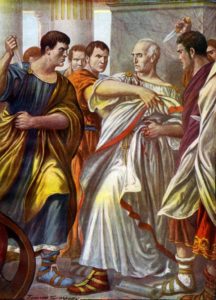-
Halloween
- The Story Behind Halloween – Lesson
- The Story Behind Halloween – Quiz
- Are You Too Old To Go Trick-Or-Treating? – Lesson
- Look out for the Blue Pumpkin – Lesson
- Is the White House Haunted? – Lesson
- Is the White House Haunted? – Quiz
- Mummies Discovered in Egypt – But That’s Nothing to Fear – Lesson
- Salem Witch Trials: When Being Called a Witch Meant Death – Lesson
- Halloween Around the World: It Isn’t Just Costumes and Candy – Lesson
- Halloween Around the World: It Isn’t Just Costumes and Candy – Quiz
-
Thanksgiving
- The Evolution of Thanksgiving – Lesson
- The Evolution of Thanksgiving – Quiz
- The Political Roots of Thanksgiving – Lesson
- The Political Roots of Thanksgiving – Quiz
- Turkey for Thanksgiving – But Why? – Lesson
- Turkey for Thanksgiving – But Why? – Quiz
- This Thanksgiving, Consider Helping the Less Fortunate – Lesson
-
Christmas
-
Easter
- Good Friday: Christ Carried Sin to the Grave – And Left It There – Lesson
- Good Friday: Christ Carried Sin to the Grave – And Left It There – Quiz
- Easter Traditions: From Rabbits to Egg Jarping – Lesson
- Easter Traditions: From Rabbits to Egg Jarping – Quiz
- Easter Monday and Egg Rolling at the White House – Lesson
- Easter Monday and Egg Rolling at the White House – Quiz
-
Federal Holidays and Observances
- New Year’s Day: Just as Political as Anything Else – Lesson
- This Presidents’ Day, Let’s Remember the Weird – Lesson
- Astounding Facts about US Presidents – Lesson
- Astounding Facts about US Presidents – Quiz
- Memorial Day: A Time of Honor and Respect – Lesson
- Memorial Day: A Time of Honor and Respect – Quiz
- From Decoration Day to Memorial Day – Lesson
- From Decoration Day to Memorial Day – Quiz
- Who Was the Poppy Lady, Moina Belle Michael? – Lesson
- Who Was the Poppy Lady, Moina Belle Michael? – Quiz
- The Origins of Flag Day – Lesson
- The Origins of Flag Day – Quiz
- America’s Flag – An Evolved Banner for an Ever-Changing Country – Lesson
- America’s Flag – An Evolved Banner for an Ever-Changing Country – Quiz
- Celebrating the 4th of July – Lesson
- Celebrating the 4th of July – Quiz
- Who Should We Thank for Labor Day? – Lesson
- Who Should We Thank for Labor Day? – Quiz
- Constitution and Citizenship Day – Lesson
- Constitution Day – The First Day of Constitution Week – Lesson
- Constitution Day – The First Day of Constitution Week – Quiz
- The Political Origins of Columbus Day – Lesson
- The Political Origins of Columbus Day – Quiz
- Columbus Day or Indigenous Peoples’ Day? – Lesson
- Columbus Day or Indigenous Peoples’ Day? – Quiz
- Veterans Day: A Day to Honor Those Who Served – Lesson
- Veterans Day: A Day to Honor Those Who Served – Quiz
- Marion Robert Goff: A Soldier’s Tale on D-Day – Lesson
- Marion Robert Goff: A Soldier’s Tale on D-Day – Quiz
- Independence Day: The History You Might Not Know – Lesson
- Independence Day: The History You Might Not Know – Quiz
-
Other Traditions
- Valentine’s Day Love Poems – Lesson
- Love Poems for Valentine’s Day – Lesson
- Who Was St. Valentine? – Lesson
- Who Was St. Valentine? – Quiz
- No Love for Valentine’s Day in the East – Lesson
- No Love for Valentine’s Day in the East – Quiz
- Beware the Ides of March – But Why? – Lesson
- Beware the Ides of March – But Why? – Quiz
- St. Patrick’s Day: A Celebration of the Irish – Lesson
- St. Patrick’s Day: A Celebration of the Irish – Quiz
- May Day: Dancing ‘Round the Maypole – Lesson
- May Day: Dancing ‘Round the Maypole – Quiz
- Cinco de Mayo: Celebrating Mexico’s Victory in Puebla – Lesson
- Cinco de Mayo: Celebrating Mexico’s Victory in Puebla – Quiz
- Mother’s Day: The Anti-War Effort Turned Holiday – Lesson
- Mother’s Day: The Anti-War Effort Turned Holiday – Quiz
- Father’s Day: More Than Just a Day for Ties – Lesson
- Father’s Day: More Than Just a Day for Ties – Quiz
- Presidential Fathers: Responsible for Their Kids and the Country – Lesson
- Presidential Fathers: Responsible for Their Kids and the Country – Quiz
- Proof of the Hanukkah Story Found? – Lesson
- Proof of the Hanukkah Story Found? – Quiz
- Roses Are Red, Violets Are Blue – April Celebrates Poetry, Too – Lesson
- Roses Are Red, Violets Are Blue – April Celebrates Poetry, Too – Quiz
Beware the Ides of March – But Why? – Lesson
Is March 15 really unlucky? Not unless you are Julius Caesar.
It’s the Ides of March – also known as March 15. This date is often seen as a bad omen – but why should we “beware the Ides of March”? And what are “Ides,” anyway?
The Roman Calendar
In the ancient Roman Republic, the Ides occurred every month. Today’s Gregorian calendar wasn’t invented until the 1500s, so time was marked differently in ancient societies.
In Rome, each month was divided into thirds: The Kalends were the first day of the month, the Nones were the 5th or 7th day, and the Ides marked the middle of the month, on either the 13th or 15th day. The Romans didn’t use a number for each day of the month like we do today; they would count backward from each marker. For example, the 3rd day of the month would be called “two days before the Nones.”
New Year Festivals

While every month contained Kalends, Nones, and Ides, the Ides of March were special because they marked the first full moon of the Roman new year. Martius (March) was the first month of the new year. The Ides were supposed to match the full moon each month, and the Kalends were supposed to correspond with the new moon, but the length of the calendar didn’t match the lunar cycle, so the dates gradually got out of alignment.
The Romans would celebrate the new year from the Kalends until the Ides of March, when the celebration of the god Jupiter would take place. The goddess Anna Perenna also had a festival on the date. Her celebration was popular among the commoners, and it’s said they would make an offering to her so “that the circle of the year may be completed happily.”
It’s thought the festival Mamuralia also occurred on March 15. It celebrated Mamurius Veturius, who was said to be the artisan who made the shields that hung in the temple of Mars, the god of war.

Julius Caesar crossing the Rubicon, 49 B.C. (Getty Images)
The Ides of March was a special time in ancient Rome, but why should we beware of this date?
The Assassination of Julius Caesar
March 15 gets its bad reputation due to an event that happened on that day. It was the date Julius Caesar was killed.
Caesar, a general and politician, had taken control as the dictator of Rome. He had been away, conquering lands in Gaul (France and Germany). He was a powerful figure, but he had political enemies in Rome, including a man named Pompey. When his campaign to conquer Gaul ended, the senate ordered Caesar to return to Rome and give up his military command. He defied the order and marched his army to the city. This began Caesar’s Civil War – he defeated Pompey’s army and was named dictator of the Republic. Apart from Pompey’s supporters, Caesar pardoned his opponents.
The dictator never managed to have himself crowned emperor of Rome, but his enemies in the senate thought he was gaining too much power and becoming a tyrant. So, they hatched a plan to assassinate him. Caesar was called to the senate, but when he arrived, he was stabbed and killed by a group of around 60 senators, including one of his greatest friends, Marcus Brutus.
The death of Caesar brought about the end of the Roman Republic and the birth of the Roman Empire.
Shakespeare’s Contribution

Julius Caesar (Photo by Fototeca Gilardi/Getty Images)
Caesar was assassinated on March 15, in the year 44 BC, but it was not until much later that the phrase “beware the Ides of March” became popular. English playwright William Shakespeare wrote the line in his play Julius Caesar, which was first performed in 1599.
The play tells the story of the conspiracy to kill Caesar. A fortune teller warns Caesar about his fate, but the dictator ignores it. The scene goes:
Soothsayer: Caesar!
Caesar: Ha! who calls?
Casca: Bid every noise be still: peace yet again!
Caesar: Who is it in the press that calls on me?
I hear a tongue, shriller than all the music,
Cry ‘Caesar!’ Speak; Caesar is turn’d to hear.
Soothsayer: Beware the ides of March.
Caesar: What man is that?
Brutus: A soothsayer bids you beware the ides of March.
Caesar: Set him before me; let me see his face.
Cassius: Fellow, come from the throng; look upon Caesar.
Caesar: What say’st thou to me now? speak once again.
Soothsayer: Beware the ides of March.
Caesar: He is a dreamer; let us leave him: pass.

A production of Shakespeare’s play “Julius Caesar” (Photo By Michael Macor/The San Francisco Chronicle via Getty Images)
The other characters in the scene – Cassius, Casca, and Brutus – are all part of the plot to kill Caesar.
A Legacy of Doom
Funnily enough, Caesar replaced the Roman Calendar with a new Julian calendar during his time as dictator. This calendar moved the new year from the Ides of March to the first of January.
These days, the Ides of March is still a phrase that means doom. It gives a sense that something unlucky will happen. But do we really need to beware of this date? Probably not – unless you are an ancient Roman dictator, you are probably safe this March 15.